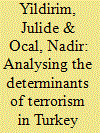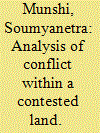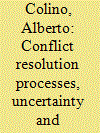| Srl | Item |
| 1 |
ID:
120393


|
|
|
|
|
| Publication |
2013.
|
| Summary/Abstract |
This paper explores the impact of moving to accrual budgeting on resources allocation in defence. Standard defence budgeting and investment models are used to assess the theoretical implications of accrual budgeting. In addition, a number of simulations are conducted to assess the long-term implications of moving to accrual accounting and budgeting. The result of the simulations shows that changes to deployed operations and other operational shocks will have manageable impacts on readiness but systematic shocks associated with defence unit prices, procurement policies and defence specific inflation will put considerable strain on the defence department's flexibility.
|
|
|
|
|
|
|
|
|
|
|
|
|
|
|
|
| 2 |
ID:
120392


|
|
|
|
|
| Publication |
2013.
|
| Summary/Abstract |
This paper investigates the determinants of provincial terrorism in Turkey taking spatial dimension into account for the time period 1990-2006. Following a traditional global regression analysis, spatial variations in the relationships are examined with geographically weighted regression (GWR) to obtain locally different parameter estimates. Empirical results indicate that increases in income and schooling ratio tend to reduce the provincial average level of terrorism, whereas an increase in unemployment enhances it. Moreover, GWR results indicate that the provincial effects of per capita income and education are more pronounced for the Eastern and South Eastern provinces compared to the Western provinces.
|
|
|
|
|
|
|
|
|
|
|
|
|
|
|
|
| 3 |
ID:
120396


|
|
|
|
|
| Publication |
2013.
|
| Summary/Abstract |
This paper considers the case of Kashmir to examine the relation between the people of the contested land (Indian-occupied Kashmir) and one of the nation states claiming it (India, in this case) in a game-theoretic framework. The motivation for this paper was whether it was possible to rationalize the lack of democratic space in Kashmir, relative to other states in India (especially since the founding fathers of the country had announced such democratic practices to be the guiding principles of the new nation) and at the same time, a highly rigid stance of the Indian Government on the Kashmir issue. An otherwise standard political economic model is used to capture how the way in which citizens determine their allegiance to one or the other nation state (India or Pakistan) can, in turn, affect the nation state's (India's) policies towards the contested land. I conclude that if the Indian Government perceives allegiance of the citizens to be determined primarily by partisan preferences of the citizens, not so much by their preferences for policies, then the government rationally concentrates on minimizing its disutility due to deviations from its 'most-favorite' policy. This understanding rationalizes the policies of the Indian Government towards Kashmir. More importantly, it points towards areas that need consideration for any peace-making process to take-off.
|
|
|
|
|
|
|
|
|
|
|
|
|
|
|
|
| 4 |
ID:
120394


|
|
|
|
|
| Publication |
2013.
|
| Summary/Abstract |
In this article, the economic impact of diminishing levels of uncertainty on investment, as a result of conflict resolution processes, is tested by means of a case study on a European region largely affected by political violence. For this purpose, the response of Basque investment during conflict resolution attempts is used as a natural experiment with which to evaluate the effect of reduced uncertainty on productive investment. Thus, it is found that productive investment in the Basque Country increased considerably when credible peace talks directed towards the end of the conflict were undertaken. Accordingly, when compared with other subsets of comparable Spanish provinces, the truces declared in 1988 and 1998 propelled the growth rate of investment in this region by 21.2 and 25.8 percentage points, respectively. This finding gives an idea on the magnitude of the potential peace dividend to be reaped in the event of an eventual conflict resolution and a complete cessation of political violence in the region.
|
|
|
|
|
|
|
|
|
|
|
|
|
|
|
|
| 5 |
ID:
120391


|
|
|
|
|
| Publication |
2013.
|
| Summary/Abstract |
The effect of military expenditure on economic growth in developing countries has been investigated by many empirical literatures. However, there is little consensus of that effect and the diversity seems to come from the use of different models and different estimators. This article applies the Augmented Solow Growth Model to examine the influence of military expenditure on economic growth for 35 developing countries over the period of 1975-2009. By using the system Generalized Method of Moments (GMM) estimators, empirical results indicate that defence has a negative and significant effect on economic growth in the sample countries.
|
|
|
|
|
|
|
|
|
|
|
|
|
|
|
|
| 6 |
ID:
120395


|
|
|
|
|
| Publication |
2013.
|
| Summary/Abstract |
The aim of this article is to explore the defense-growth relationship in France. In particular, in the context of the crisis, we would like to compare the effects of military and nonmilitary spending on growth. Our results reveal that this is a complex relationship with a bidirectional causality. In the long run, defense expenditure exerts a positive influence and outperforms the impact of nondefense expenditure. However, an opportunity cost arises in the short run.
|
|
|
|
|
|
|
|
|
|
|
|
|
|
|
|